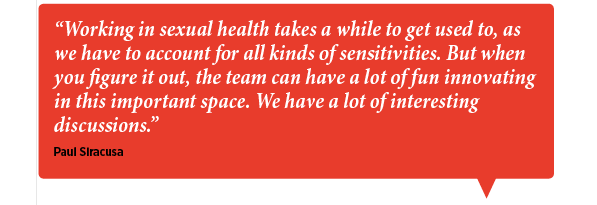 While you might not have heard of Church & Dwight, chances are you’ve heard of one of its big brand names. Arm and Hammer, Trojan, First Response, OxiClean—these and other products are the company’s bread and butter. And behind each of these products is an idea, one that’s probably been bounced around the office of Paul Siracusa.
While you might not have heard of Church & Dwight, chances are you’ve heard of one of its big brand names. Arm and Hammer, Trojan, First Response, OxiClean—these and other products are the company’s bread and butter. And behind each of these products is an idea, one that’s probably been bounced around the office of Paul Siracusa.
Siracusa is the head of the company’s Global Research and Development team, which is tasked with helping innovate the next big thing for each brand. It’s a big job. With $2.8 billion in annual sales, Church & Dwight is one of the biggest players in consumer-product manufacturing, a turbulent, high-stakes market that is prone to the slightest whim.
“I support all the technical aspects of the organization, whether it’s designing and developing the products all the way through commercialization and launch, including the engineering and scale-up at the plant,” Siracusa explains. “All these activities are focused on making the products cost effective for the consumer by developing and producing them at low cost.”
Siracusa is well-suited for the role, as he brings a science background to his corporate leadership skill set. In order to drive the success of Church & Dwight’s portfolio, his team adheres to what it calls the “4Ds of R&D”—discover, develop, deliver, and delight.
Siracusa explains: “We have to discover insights into consumers and technologies. We then develop those insights and technologies into products, and deliver them to our partners in manufacturing and, ultimately, to the customers and consumer, where we’ve hopefully got it right. Our goal is to always delight our consumers and customers, and drive the repeat purchase. R&D encompasses the total gambit of activities to offer consumers products with great value and great benefits.”
With quality-driven offerings set at a low price point, Church & Dwight has benefitted during the lean times of the recession—public disclosure of the company’s results shows that business has been up significantly over the last few years. The company’s recent innovations with its Trojan brand of sexual-health products offer a case in point.
“Working in sexual health takes a while to get used to, as we have to account for all kinds of sensitivities,” Siracusa says. “But when you figure it out, the team can have a lot of fun innovating in this important space. We have a lot of interesting discussions.”
To guide its process, Siracusa’s team works on an annual cycle, carefully launching new condoms and vibrators that bring with them new benefits for consumer sexual health. This cycle is fueled by ongoing R&D into the scientific side of sexual health. For condoms, the company tackles how to encourage consumers to use them more compliantly, as well as ways to prevent the spread of disease and avoid unwanted pregnancies. With vibrators, the onus is on the examination of how a good sex life leads to better health and improved self-esteem. Advising Trojan’s R&D team is an advisory committee of notables from the sexual-health industry, which includes a former Surgeon General, Joycelyn Elders.
Regardless of the product, Church & Dwight has to balance innovation with its balance sheet. “We have to deliver these consumer benefits at a cost-effective price,” Siracusa says. “This is the hardest challenge, as we’re competing against very large companies.”
Helping to keep costs down, from an R&D perspective, is Church & Dwight’s adherence to the open innovation model. The company has a network of scientists and inventors all over the world, and many of Church & Dwight’s breakthroughs come from this network. “Small to midsize companies have been using open innovation for years, as they don’t have the resources to research and invent everything themselves; they have to embrace products and technologies from the outside,” Siracusa says. “It’s an approach that helps us to compete and win.”
But even having the best product on the market isn’t a guaranteed sell. For Siracusa, Church & Dwight stands apart from the competition with its agility, speed, and spirit, something that he attributes to the leadership of CEO Jim Craigie.
“He’s a tremendous leader who has instilled this vision into the company, which has become the framework of the organization today,” Siracusa says. “Our success today is grounded in his leadership style—he’s not afraid to take a chance and go for the win. The easiest decision to make is to say no, because you know what the end result is going to be. But when you say yes, even when you’re not sure, then at least you have a chance to succeed. As a company, we’re not afraid to lose, we don’t play to not lose—we only play to win. And when you have a team galvanized around that principle of leadership, good things happen.”


